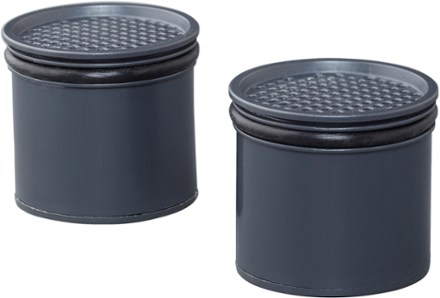Home
Effluent Dye Removal by Microwave-Assisted Activated Carbon
Barnes and Noble
Effluent Dye Removal by Microwave-Assisted Activated Carbon
Current price: $44.99


Barnes and Noble
Effluent Dye Removal by Microwave-Assisted Activated Carbon
Current price: $44.99
Size: Paperback
Loading Inventory...
*Product information may vary - to confirm product availability, pricing, shipping and return information please contact Barnes and Noble
This book explores the potential of advanced microwave techniques, specifically microwave-assisted pyrolysis, for the production, adsorption, and regeneration of activated carbon (AC) as a promising solution to address wastewater pollution caused by dyes. The author begins with a chapter devoted to the environmental implications of water pollution and emphasizes the characteristics of dyes and various treatment techniques for their removal. The advantages and disadvantages of commercially available activated carbon are also discussed, along with the determinants for effective adsorption using high-quality activated carbon. Additionally, the chapter delves into the different types of adsorbents, including agricultural and industrial waste, as well as bioadsorbents such as microorganisms.
In Chapter 2, readers will find the latest trends in using microwave techniques for the activation process. In this chapter, the author elucidates the characteristics and mechanism of microwave heating and compares it with conventional heating methods. The advantages of microwave techniques, such as improved activation procedures and the influence of different factors, are explored. Various modeling and optimization approaches for adsorption and different techniques for analyzing the surface chemistry of activated carbons are also discussed. Furthermore, the chapter showcases the applications of microwave-assisted activated carbon for dye removal.
The book closes with a chapter devoted to the recycling and regeneration of spent activated carbon (SAC) using microwave techniques. In this chapter, the author examines the procedures for SAC regeneration through microwave-assisted pyrolysis and highlights the advantages over conventional heating methods. The applications of microwave-assisted activated carbon regeneration and other miscellaneous technologies utilizing microwave heating for AC production and SAC regeneration are also explored.
Given its breadth, this book is a valuable resource for researchers, professionals, and policymakers in the field of environmental science and engineering.
In Chapter 2, readers will find the latest trends in using microwave techniques for the activation process. In this chapter, the author elucidates the characteristics and mechanism of microwave heating and compares it with conventional heating methods. The advantages of microwave techniques, such as improved activation procedures and the influence of different factors, are explored. Various modeling and optimization approaches for adsorption and different techniques for analyzing the surface chemistry of activated carbons are also discussed. Furthermore, the chapter showcases the applications of microwave-assisted activated carbon for dye removal.
The book closes with a chapter devoted to the recycling and regeneration of spent activated carbon (SAC) using microwave techniques. In this chapter, the author examines the procedures for SAC regeneration through microwave-assisted pyrolysis and highlights the advantages over conventional heating methods. The applications of microwave-assisted activated carbon regeneration and other miscellaneous technologies utilizing microwave heating for AC production and SAC regeneration are also explored.
Given its breadth, this book is a valuable resource for researchers, professionals, and policymakers in the field of environmental science and engineering.















